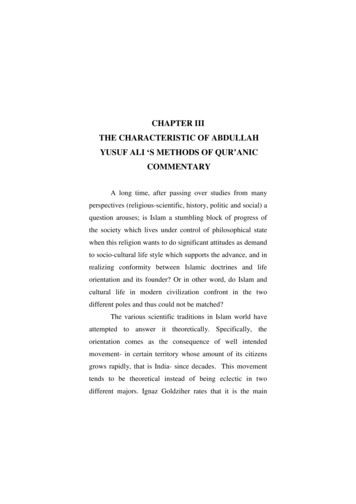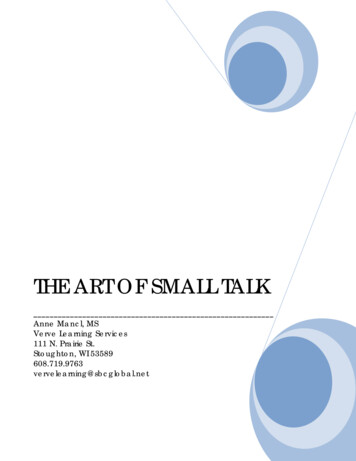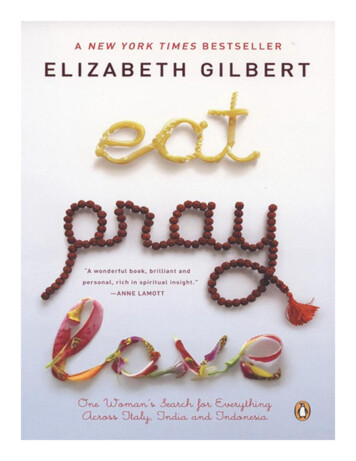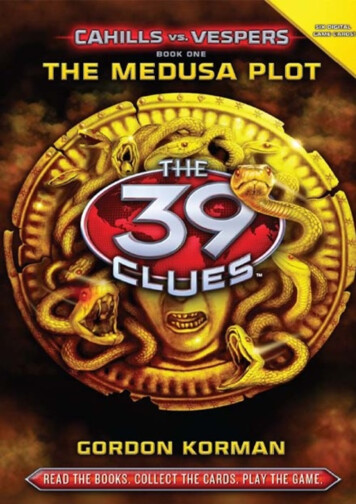
Transcription
68CHAPTER IIITHE CHARACTERISTIC OF ABDULLAHYUSUF ALI ‘S METHODS OF QUR’ANICCOMMENTARYA long time, after passing over studies from manyperspectives (religious-scientific, history, politic and social) aquestion arouses; is Islam a stumbling block of progress ofthe society which lives under control of philosophical statewhen this religion wants to do significant attitudes as demandto socio-cultural life style which supports the advance, and inrealizing conformity between Islamic doctrines and lifeorientation and its founder? Or in other word, do Islam andcultural life in modern civilization confront in the twodifferent poles and thus could not be matched?The various scientific traditions in Islam world haveattempted to answer it theoretically. Specifically, theorientation comes as the consequence of well intendedmovement- in certain territory whose amount of its citizensgrows rapidly, that is India- since decades. This movementtends to be theoretical instead of being eclectic in twodifferent majors. Ignaz Goldziher rates that it is the main
69cause of paradoxical meaning and essence of Islam as theabsence of Islamic mobilization to modern paradigm. Ethicalvalue is finally determined to temporal-relative cases, whileduties are obligated through the truth of stabled syari’ah(religious legitimacy).1 Therefore, the Indian reformers suchas Sayyid Amir Ali (1849-1928)2, Ahmad Khan3, Iqbal(1876-1938)4, etc voiced the change.Sayyid Ahmad Khan viewed that the cause of Muslimbackwardness in India is their reluctant to follow the world1Ignaz Goldziher, Madzhab Tafsir; Dari Aliran Klasih HinggaModern, translate: Alaika Salamullah, et.al, (Yogyakarta: eLSAQ Press,2003) p: 3802Sayyid Amir Ali is the founding father of NationalMohammedan Association which was the association for Indian Muslimunity and was aimed to defend the interest of Muslim and to train themthe politics. Sayyid Amir Ali is also considered as a loyal reformist to thecrown. Sayyid Ali argued that the cause of Muslim backwardness is theirargument that the possibility of ijtihad has been closed.3Ahmad Khan is the founding father of MAOC (MohammedanAnglo Oriental College) in Aligarh. His thought mostly supported thecrown and therefore he is considered reformist whose loyalty is high tothe crown. His action is not more but to raise the status of Islam and makeeducation as the problem solving of declining easily reached.4Hazrat Allama Sir Dr. Muhammad Iqbal was a Persian andUrdu poet, philosopher and politician whose vision of an independentstate for the Muslims of British India was to inspire the creation ofPakistan. He voiced the dynamical thought. For him, Islam backwardnessis influenced by the zuhd teaching in mysticism. Therefore, he suggestedcoming back to ijtihad because ijtihad is still needed. It is different fromother reformists; Iqbal thought that Western culture must not be the mainreference because for him, western civilization is much influenced bymaterialism which tends to leaving religious teaching. One thing shouldbe taken by Muslim is science and technology.
70development. Classical civilization is gone and comes thenew one in the West. The basic of this new civilization isscience and technology which are assumed as the main basicof Western progress and power.5 He saw the necessity ofBritish culture and western civilization for Indian Islamicsociety. His wonderfulness to English culture made him givehis loyalty to empire.6 Besides, there were many otherreformists who shown their loyal attitudes to England. Thisclose relationship then influenced the development of Islamicthought in India.In the discourse of Indian Islamic thought, there werevarious religious characteristics in concerning with somepreferences to critical analysis of The Qur’an which causesmethodological segmentation of this study. In 1911 A.D.Mirza Abu al-Fadhl wrote a journal “Allah Abad”- aQur’anic text with English translation and was arrangedfollowing its times of revelation (tartîb zamani). It was a bigstep as objective and liberal perspective in studying TheQur’an. It is clear that related matter to this study is thepreference shown in modern exegesis school towards the5Harun Nasution, Pembaharuan dalam Islam; Sejarahpemikiran dan Gerakan (Jakarta: PT. Bulan Bintang, 2003) p: 1606Ibid., p: 165
71sacred and authentic Qur’an. Still in the perspective ofmodern thought, maintaining the holy of The Qur’an isimportant to keep it free from changes.7The Indian modernity movement claimed themselvesspecifically as a cultural movement emerged from thereflections of coming thought as an adaptation of Islam worldto Europe. Thus, the reformation they voiced about is beinginfluenced by western culture, while religious understandingranks the second position and has less priority.8Above those all, coming several new names as agentsof social change. And Abdullah Yusuf Ali9 is noted as one nding through the works. His phenomenal work, TheHoly Qur’an, Text, Translation and Commentary rated thebest rank in the society goes towards modernity. The worksof Yusuf Ali are considered well for its contributions tocombine the two opposite poles, a good combination ofculture and Islam.7Ignaz Goldziher, op. cit., p: 390-391Ibid., p: 3929Later will be called Yusuf Ali or Ali.8
72A. Biography of Abdullah Yusuf Alia. Life of ChildhoodYusuf Ali was born on April 4, 1872 in Surat,Gujarat, West India.10 He is the second son of YusufaliAllahbuksh,11 who spent his young age to gain religiouseducation and was then able to memorize The Qur’an. Hewas in between the ages of four and five that he first learnedto read Qur’an Arabic words, to revel in its rhythm andmusic, and wonder at its meaning. A dim recollection of thehatm ceremony that closed that stage really began hisspiritual awakening that has gone on ever since.12When he was little boy, his revered father taught himArabic, told him those all world’s thoughts, all the world’smost beautiful language and literatures are but vehicles forthat ineffable message which comes to the heart in race10M.A. Sherif, Jiwa Yang Resah; Biografi Yusuf Ali Penerjemahdan Penafsir al-Qur’an Paling Otoritatif dalam Bahasa Inggris ,translate: Rahmani Astuti ( Bandung,: Mizan, 1997) p: 18. Other sourceshows that Abdullah Yusuf Ali was born at 14th of April 1872 in Bombay,India. See http://en.wikipedia.org/wiki/Abdullah Yusuf Ali (retrievedon Tuesday, January 12, 2010)11Yusufali Allahbuksh is an official of police force in theresidence of Surat, when he retired in 1885, he was titled Khan Bahadur,an appreciation from Raj to Muslims for their merits to society. He diedon July, 1891. M.A. Sherif, op. cit., p: 1912Abdullah Yusuf Ali, The Holy Qur’an; Text, Translation andCommentary (New Delhi: Goodword Books, 2008), p: iii.
73moments of ecstasy.13He is good English and Arabicspeaker and thus, he studied English literature and visitedsome European universities to study. Yet, he told that despitehe had explored western lands, western manners, and thedepths of western thought and western learning to an extentthat has rarely fallen to the lot of an Eastern mortal. But hehad never lost touch with his Eastern heritage.14b. Educational BackgroundYusuf Ali was obsessed with titles. His father,Yusufali Allahbuksh, a Bohra from Surat in Gujarat, hadabandoned the traditional occupation of the Bohras -business -- and gone instead into the police force. Onretirement, he was given the title of Khan Bahadur. True toform, the young Yusuf Ali incorporated this honorary titlegiven to his father into his own name. The British seemed tobe charitable, at least to those who pledged unquestioningloyalty to them, to allow such an indiscretion to rch?hl id&q Abdullah yusuf ali&start 10&sa N (retrieved on Tuesday, January 12, 2010)
74Yusuf Ali used the name Abdullah ibn Khan BahadurYusuf Ali while applying to register at Cambridge Universityin 1891, the Lincoln Inn in London as well as when applyingfor the ICS (Indian Civil Service). 'The Indian Officeadministrator responsible for processing ICS applicationsdeemed the double-barrelled surname in order and Abdullahibn Khan Bahadur Yusuf Ali came about. Yusuf Ali usedvarious names such as “Abdullah Khan Bahadur Yusuf-Ali”,a not common title for mentioning his father’s title instead offamily’s title. Other names he often used were “Abdullah ibnKhan Bahadur Yusuf Ali”,”Abdullah KB ibn Yusuf Ali” and“A.I.K.B. Yusuf Ali”.16The young Yusuf Ali studied in the Anjuman e-Islamin Bombay, and continued to Wilson School (a seminaryschool of Scotland).17 When he was 15 year old, he registeredthe Wilson College which affiliated to University of Bombay.He got good achievement in Wilson School and got the bestmark for Bombay resident, and then he got the title of BAfrom University of Bombay in 1891 because of his best in thelecture of ancient Greek literature.16He received theM.A. Sherif, op. cit., p: 19Wilson School was established by John Wilson, a crediblelinguist and historian of west India, he translated the Bible into Maratsilanguage.17
75scholarship to continue his study in St John’s CollegeCambridge by the main concentration is law. By September1891, he arrived in England and began his long struggle. Hisgreat interest to literature brought him to be a member ofRoyal Society of Arts and Royal Society of Literature.18c.Political CareerA peculiar product of the era of British raj, Yusuf Aliwas a pukka sahib par excellence. For him loyalty to thecrown was of paramount importance. Religion was a personalmatter.19 It should, therefore, come as no surprise to learn thathe married an English woman in a church in England. Thatthe woman should prove unfaithful despite giving birth tofour of his children, perhaps best epitomizes the relationshipbetween the empire and India20.Yusuf Ali's life crossed the lives of other eminentpersonalities that loomed so large on the Indian scene later:18M.A. Sherif, op. cit.,p: 41Abdullah Yusuf Ali delivering the message of Qur’an asindividual hopeful message not as guidance for government nor societalregulation. Note 580.20Abdullah Yusuf Ali married a Christian, Teresa MaryShalders. The marriage was held at 18th of September, 1900 in St Peterchurch, Bournemouth and was led by Canon Henry Slater. Teresa was 27year old, a year younger than Yusuf Ali. His sons are Edris, Asghar Bloy,Alban Hyder and a daughter, Leila Teresa. M.A. Sherif, op. cit.,p: 3319
76Muhammad Ali Jinnah, Ameer Ali, Muhammad Iqbal,Muhammad Ali Jauhar, Fazl-e-Husain, Sikandar Hayat KhanEtc. Of these, he found much in common with the last two.Both these men -- and their families -- were the recipients ofBritish largesse and therefore, inimical to the interests of theMuslims in India. They represented the interests of the landedaristocracy which had been rewarded for its services to theraj.21 Abdullah Yusuf Ali’s penchant for titles not withstanding, it was his obsessive loyalty to the crown that sethim apart from many of his contemporaries. While he gotalong well with Iqbal, their views were diametricallyopposite.22 There was a political big gap between Yusuf Aliand Iqbal, yet, both of them keeping good relationship. Andso was between Yusuf Ali and Jinnah. The gap must becauseof their different view of Allahabad resolution, declared byIqbal in 1930 as the demand of founding a Muslim statewhether “inside or outside” the empire. Yusuf Ali through hisspecial loyalty to the crown surely refused the demand,21This parasitical class is still active in the affairs of Pakistan,reducing it to penury22Iqbal saw Islam as a global religion and the Muslims of Indiaas a distinct community who could get nothing either from the British orthe Hindus. For Yusuf Ali religion was a matter for personal salvation.The 'Indian nation' in which both Hindus and Muslims lived amicably,pledging loyalty to the crown, was how he viewed things in life.
77saying that the evolution of Indian British culture isdominated by British ideas live behind protests of those whorebel and fight against what they identify as strange idea.23Yusuf Ali was much inspired by Sayyid AhmedKhan.24 He tried to emulate him, at least in so far as loyalty tothe empire was concerned, to the fullest. Their opinion todrum up India is almost the same that is by keeping in touchwith British culture. Abdullah Yusuf Ali’s education at thebest British institutions, admission to the bar as well asselection in the ICS all reinforced his loyalty to Britain. Hewas an unabashed spokesman and ambassador for the crownall his life. Yet the wily British used him and then discardedhim. His greatest disappointment came when he found thatthe British had reneged on their pledge to the Arabs inPalestine. He suffered their insults and arrogance willingly,something the likes of Jinnah and Iqbal would never have putup with. One can only surmise that his total devotion toeverything British blinded him to the reality of life.\23M.A. Sherif, op. cit.,p:101Ibid., p: 36, the comprehensive writing of Sayyid AhmedKhan’s thought see Harun Nasution, op. cit., p: 158-16624
78d. A Mess LifeEqually shocking is the contrast in his public andprivate lives. He was known to charm public gat herrings. Hisreputation was not confined to India or Britain alone. Itquickly crossed the Atlantic and he found himself in Canadain the autumn/winter of 1938 after his translation waspublished both in UK and in the US. He officially opened thefirst mosque in Canada in Edmonton in December 1938. Itwas Yusuf Ali who named it Al-Rashid Mosque, perhapsafter his son. He left a very favorable impression with all thathe came in contact with yet his private life was a total failure.He was a loner in private life. The face of public charmappeared to be an attempt to hide the deeper failure at thepersonal level.His first wife proved unfaithful and left him foranother man.25 Yusuf Ali could not see that infidelity was,and remains an acceptable way of life in the west. Hischildren, too, abandoned and resented him. He was tooengrossed in public life currying the favors of the raj to paymuch attention to the family. Despite his intense loyalty to25He is Obed Thorne. The demand of divorce was convened inthe court of family division on June and the decision obtained on January1912. M.A. Sheriff, op. cit.,p: 44
79the British, they were glad to see his back when he wanted toretire from the ICS.The second wife, Gertrude Anne Mawbey orMasuma26 left him and married another man. Their singleson, Rasyid lived far from his father, and Abdullah Yusuf Alihimself lived alone until he was found by police lying outsidethe steps of a house in Westminster on December 9, 1953. Hewas a pathetic wreck, disoriented and confused. The policebrought him to local hospital and placed him in an old folks’home in Dove house Street, Chelsea. Day by day, hiscondition was worse. He got sick and died in St Stephen’shospital in Fulham on the following day, December, 10 1953.He was buried in Brookwood Cemetery in Surrey. It isnearby Marmaduke Pickthall’s resting place.27B. The Skates of Abdullah Yusuf Ali’s Work1. The Background of WritingThere are several purposes behind the writing of TheHoly Qur’an, Text, Translation and Commentary, those are:26She is the daughter of Thomas Mawbey, a judge of Derby andentrepreneur of printing office. Having married in 1920, Abdullah YusufAli was 47 year-old.27Ibid., p: 148-150
80First, there are many mischiefs done by translationsof non Muslims and anti Muslims writers. From them isMarraci28 who had produced in 1689 a Latin version of TheQur’an with the Arabic text and quotations from variousArabic commentaries, carefully selected and garbled, so as togive the worst possible impression of Islam in Europe.Marraci was a learned man, and there is no pretence about theobject he had in view. , viz., to discredit Islam by showing ofquotations from muslims authorities.29 The first Englishtranslation by A. Roes was but a translation of Du Ryer of1647, and was published a few years after Du Ryer’s. GeorgeSale’s translation (1734) was based on Maracci’s Latinversion, and even his notes and his preliminary discourse arebased mainly on Marraci. Considering that Marraci’s objectwas to discredit Islam in the eyes of Europe, it is remarkablethat Sale’s translation should be looked upon as a standardtranslation in the English speaking world, and should passthrough edition after edition, being even included in theseries called the Chandos Classics and receiving the28He is a confessor to Pope innocent XI, his work is dedicated tothe Holy Roman Emperor Leopold I and he introduces it by anintroductory volume containing what he calls a “Refutation of theQur’an”.29Abdullah Yusuf Ali, op. cit.,p: xiii
81benediction of Sir. E. Denison Ross. The Rev. J. M. Rodwellarranged the sûrah in a rough chronological order. Histranslation was first published in 1861. Though he tries torender the idiom fairly, his notes show the main of aChristian clergyman, who was more concerned to “show up”the Book than to appreciate or expound its beauties. Prof. E.H. Palmer’s translation (first published in 1876) suffers fromthe idea that The Qur’an ought to be translated into colloquiallanguage. He failed to realise the beauty and grandeur of stylein the original Arabic. To him that style was “rude andrugged”; his translation may justifiably be called careless andslipshod30. This amount of mischief then led Abdullah YusufAli to straighten the mistakes and to show the glory of TheQur’an.Second, this writing is to help people even the least bitfurther in understanding its meaning, or appreciating itsbeauty, or catching something of the grandeur of the original.In his preface to first edition, Yusuf Ali said:It is duty of every muslim, man, woman, or child, toread The Qur’an and understand it according to hisown capacity. If any one of us attains to someknowledge or understanding of it by study, and thetest of life, both outward and inward, it is his duty,30Ibid., p: xiv.
82according to his capacity, to instruct others and sharewith them the joy and peace which result fromcontact with the spiritual world. The Qur’an-indeedevery religious book-has to be read, not only with thetongue, voice and eyes, but with the best light that ourintellect can supply, and even more, with the truestand purest light which our heart and conscience cangive us. It is in this spirit that I would have my readersapproach The Qur’an. 31He translated the noble words of The Qur’an forhimself and tried to apply to his experience repeatedly. Theservice of The Qur’an has been the pride and the privilege ofmany Muslims. He felt that with such life-experience as hadfallen to his lot, his service to The Qur’an should be topresent it in a fitting garb in English. He had cherished thatambition in his mind for more than forty years. He collectedbooks and materials for it. He visited places, undertakenjourneys, taken notes, sought the society of men, and tried toexplore their thoughts and hearts, in order to equip himselffor the task. Sometimes, he considered it too stupendous forhim, the double task of understanding the original, andreproducing its nobility, its beauty, its poetry, its grandeurand its sweet practical reasonable application to everydayexperience.Third, the main reason of his works is his mission to31Ibid., p: iii
83unite western and eastern culture. His tendency to westernculture really affected his idealism, including his reason tary. M.A. Sherif said that this project is his purposeto focus on polarization between East and West.32 Easternliterature has the Great Book (The Qur’an), and Yusuf Alioffered this Eastern best tradition to the West. Hence, he triedall efforts to translate it into English which he wished to bethe language of Islam.33 His creative motivation is not only awill to serve society, but also a will to make Muslims be goodcitizens for empire.34Fourth, this project is his solace from his lifesufferings. A man’s life is subject to inner storm far moredevastating than those in physical world around him are. Insuch a storm - he said, in a bitter anguish of a personalsorrow that nearly unseated his reason and made life seemmeaningless, a new hope was born out of systematic pursuitof his long cherished project. Watered by tears, his32M.A. Sherif, op. cit.,p: 174Yusuf Ali told that English is appropriate to Indian education.He said that every regional language is influenced by English literature.Upon those all, English is communicating media among provinces and theworld outside. Indeed, the usage of English is the best bound united allIndian nation, provinces and communities. Otherwise, Indian federation isonly a dream. M.A. Sherif, op. cit.,p: 102-10334Ibid., p: 18733
84manuscript began to grow in depth and earnestness if not inbulk. Yusuf Ali, precisely found his spiritual soul wasawakened. He found peace within the process of writing.Yusuf Ali, through his Holy Qur’an, Text, Translationand Commentary would like to serve the beauty and thesignificance of The Qur’an. This work, however, is valuablefor Muslims, the footnotes provided here are to explain themeaning of verses. Some of them are helpful, but some othersseem odd if not careful.2. The Book System of WritingSince its first publication, The Holy Qur’an, Text,Translation and Commentary as the work of Abdullah YusufAli has passed times of changing and reprinting. The changesoften found in the edition published by Amana, IFTA, andSaudi Arabia as well. The changes generally are not principletherefore do not change the essence of this work.3535Modern editions of his work remain in print, but withmodifications such as "God" altered to "Allah" and with controversialmodifications of the opinions that Ali expressed in footnotes and of shorthistorical articles that were included with the original text. For instance,Ali's liberal views on credit and interest do not appear in some editions, asthey are considered to run contrary to some schools of Islamic economicthought. Those publishers also omitted the explanation of the martyrdomof imam Hasan and Husein. But. It is lucky that his work which waspublished by Amana Corp, Brentwood, Maryland, USA did not ommit
85The main reference used by the writer in arrangingthis thesis is The Holy Qur’an, Text, Translation andCommentary, already printed in India, by Goodword Booksin 2008. This edition gives no changes as others do because itbasically refers to the editions printed in Cairo and Beirutwhich are the same with the original work firstly printed inLahore. The writing systematic of his work is below:a) CoverThe cover of this book consists of title andpublisher, “The Holy Qur’an, Text, shed by Goodword Book.b) ContentInside this book are:- Preface to First edition, 1934, speaks moreabout his childhood and life, background ofwriting, process of bookmaking, and thegoal he wanted to achieve in translating andcommenting The Qur’an into English. Healso explained the systematic system ofand change anypart of it as well. See his work, The Holy Qur’an, Text,Translation and Commentary published by Amana Corp inMaryland,USA, 1983.
86writing and a little bit of methods he appliedin his translation and commentary.- Preface to third edition. Inside is gratitutionto his colleagues.- Commentaries on The Qur’an. This part ishisviewaboutcommentaryanditsdevelopment. Besides, he outlined themethods he applied and previous works ofcommentary he referred.- Translation of The Qur’an is Yusuf Ali’sexplanation of Qur’anic translations. There,he drew critics to improper translationswhich are assumed not careful.- Useful works of reference. It is a list ofadditional books he used as references.- Transliteration of Arabic words and names ishis style of writing Arabic words in Latinletter forms.- Abbreviation Used. It is explanation ofabbreviated letters he applied in his work.- Punctuation marks in the Arabic text, anexplanationpunctuation.oftheimportanceof
87- Divisions of The Qur’an, the way Yusuf Alidivided each part of The Qur’an.- Table of content- Text, Translation and Commentary of TheHoly Qur’an1. TextIn writing the text of The Qur’an,Yusuf Ali referred to the generalapproved mushaf. The text in English(translation) is displayed differently inparallel columns with the Arabic text.Each of sûrah and verse are wellnumbered. The numbering system isfollowing the system used in Cairowhich is considered representative ofArabic world. In his preface to firstedition he mentioned that he usedroman number to indicate the sûrah,and common number to indicate theverse. Example: ii. 25 means: thesecond sûrah (al-Baqarah) and the 25th
88verse.36 This number is written in thetop of passage. He also maintained theuse of letter of ‘ain (rukû’) to indicatethe text division as generally used inArabic texts. Only, the new of his workis his division of particular rukû’, thelong rukû’ will then divided into themore specific division called “subdivision of rukû’” which characterizedby the use of bold and larger font in thebeginning of English translation.372. TranslationIn the text of translation, Yusuf Alinumbered the word which supposedneeds additional explanations. Theexplanations then written in footnote36In The Holy Qur’an already printed by Goodword Books, thiskind of numbering used in commentary, not in the text as in othereditions. In concerning with numbering text, this edition does not apply asthe example above. Sûrah is written by common number and letter and isplaced in the top of passage. Example: Sûrah 2: al-Baqarah.37As the example is his division to Q.S. al-Imran. He dividedthat surah into 20 parts. The second part of those are divided into two, thefirst part10-13 speaks about people of the book and 14-20 speaks aboutbelievers.
89which are commentary for the versesas well.3. CommentaryYusuf Ali did not explain the verses indetail, he simplyanalyzed the verseswhich are assumed need additionalexplanations in his footnote.38 Thereare about 6310 footnotes provided forexplainingthemessagesofTheQur’an. Inside, Yusuf Ali used stmakeofabbreviations ask reader to refer (bythemselves) to notes he mentioned.Words/sentences which are particularlydifferent from others will be written initalic words.The difference between commentary ofYusuf Ali and others’ is that Yusuf38Ali made the notes as short as possible consistently with theobject he had in view, viz., to give to English reader, scholar as well asgeneral reader, a fairly complete but concise view of what he understoodto be the meaning of the text. To discuss theological controversies orenter into polemical arguments he considered outside his scope. He alsodidn’t devote much space to grammatical or philological notes.
90Ali’s is preceded by a poetry speaksabout the content of upcoming verses.He also inserted poetry inside thesûrah. And to start talking the contentof each sûrah, he gave a littleexplanation about the general contentin “introduction”.c) ClosingAs the closing of his work are:- Conclusion; is a poetry persuades people toworship God and His messenger and to holdstrongly The Holy Qur’an.- L’envoi, is closing preface from Yusuf Ali.- Index3. Translation of The Qur’anThe Qur’an has been translated into most oflanguages of Asia and Europe and into some of African ones.Throughout the 19th century, the translations were normallymade without removing from the Arabic. In the 20th century,the first English version made by muslims appear. Manyversions by orthodox muslims including Picktall, 1930,
91Billingual; 1938, 1976, A.Yusuf Ali; 1934, Dawood; 1956and by the Ahmadiya.39.The Holy Qur’an, Text, Translation and Commentaryis the result of Abdullah Yusuf Ali’s attempt to serve TheQur’an with the deepest hearth. In the process of translatingthe text, Yusuf Ali passed over the phases. The phases are notmerely removing the original words to English, but involvinganalytical process before expressing it into the English. Here,it is seen that there is a kind of restructuring process oftranslation before expressing it in the most appropriate sense.In the process of translation, Abdullah Yusuf Alihonestly recognized that he found many difficulties. Thosedifficulties are clearly stated as First, Arabic words in the texthave acquired other meanings than those which wereunderstood by the apostle and his companions. All livinglanguage undergoes such teddifferent meanings of vocabularies of The Qur’an. The Lattersometimes forget the achievement already achieved by theirpredecessors. Despite those meanings are not always39The Excyclopedia of islam; New Edition Vol: V Prepared by Anumber of Leading Orientalist, (Leiden: E. J. Brill, 1986) p: 439-442.
92appropriate with the spirit of the verses, yet, Abdullah YusufAli attempted to classify those notions critically.Third, Classical Arabic has a vocabulary in which themeaning of each root-word is so comprehensive that it isdifficult to interpret it in a modern analytical language wordfor word, or by the use of the same word in all places wherethe original word occurs in the text. A striking example isfurnished by the word shabr, on ii.45 and ii. 153. Eventhough one particular shade of meaning may be predominantin any particular passage, the others are latent.Fourth, an opposite error sometimes arises because incertain matters the rich vocabulary of The Qur’andistinguishes between things and ideas of certain kind byspecial words, for which there is only one general word inEnglish. For example, words of ‘afa, safaha and ghafarawhich only can be translated as “to forgive”.Fifth, God’s purpose is eternal, and His plan isperfect
72 A. Biography of Abdullah Yusuf Ali a. Life of Childhood Yusuf Ali was born on April 4, 1872 in Surat, Gujarat, West India. 10 He is the second son of Yusufali Allahbuksh, 11 who spent his young age to gain religious education and was then able to memorize The Qur'an.











